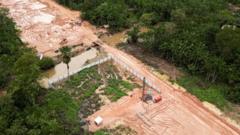A significant highway project, Avenida Liberdade, is underway in Brazil as preparations accelerate for the COP30 climate summit in Belém. The four-lane road cuts through vast areas of protected Amazon rainforest intended to accommodate over 50,000 attendees, including global leaders, at the November event. While state officials promote the highway as "sustainable," environmental advocates and local residents argue it is directly counterproductive to climate efforts.
Drone footage reveals a stark contrast between dense greenery and the vast cleared land along the 13 km (8 miles) stretch of the highway. Machinery now dominates the area, raising concerns about the long-term effects of deforestation in one of the world's most critical ecosystems. Claudio Verequete, a local resident, lamented the destruction that has left him without a livelihood from açaí berry harvesting. He fears further development once access to the region is enhanced by the highway.
"The harvest has already been cut down. We no longer have that income to support our family," said Verequete. His community remains disconnected from the newly constructed road, effectively leaving them without the benefits that infrastructure could provide. Wildlife experts are also alarmed by the highway’s potential to fragment the ecosystem, disrupt animal movements, and limit natural habitats.
Prof. Silvia Sardinha, a wildlife veterinarian, expressed significant concerns, emphasizing the detrimental impact on local wildlife rehabilitation efforts. "From the moment of deforestation, there is a loss," she stated, highlighting the risks to both biodiversity and the communities that rely on it.
While Brazil's president and the environment minister claim the summit will shed light on the needs of the Amazon, locals argue their voices are being overlooked. The highway, which had been shelved due to environmental concerns since 2012, now joins a series of infrastructure initiatives aimed at modernizing Belém ahead of the summit.
Infrastructure secretary Adler Silveira defended the project as a means of sustainable development, featuring wildlife crossings, improved public transport, and green initiatives. However, opinions within the community are divided, with some business owners optimistic about economic opportunities stemming from the influx of visitors.
"I hope discussions lead to real actions for cleaner air in the future," noted João Alexandre Trindade da Silva, a local herbal medicine seller. As scrutiny mounts over the environmental implications of hosting world leaders and the required infrastructure, the instance serves as a focal point for ongoing debates about climate accountability and preservation in one of the planet's most vital resources, the Amazon rainforest.




















